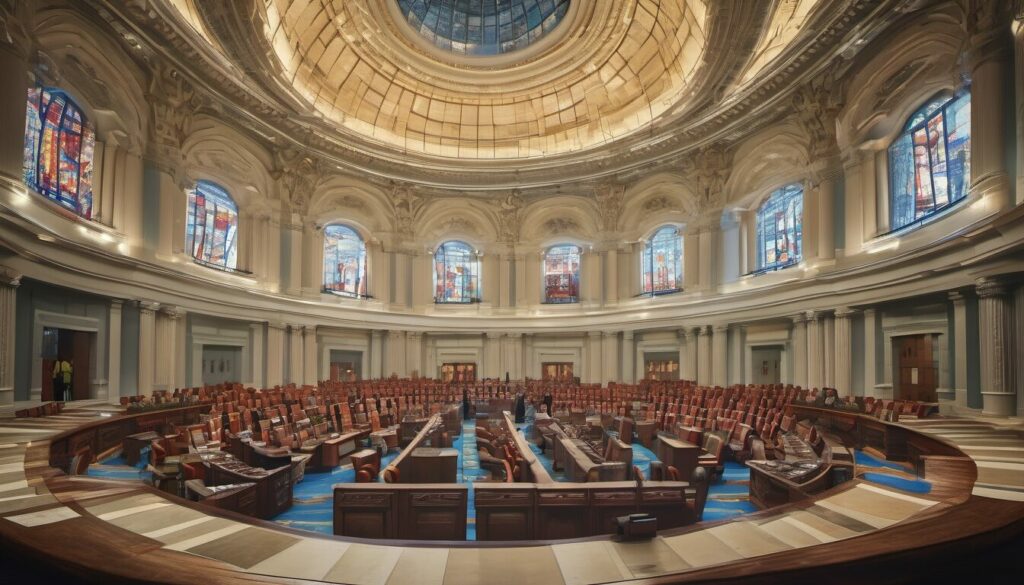In the vast landscape of political thought and practice, few concepts have shaped modern governance and society as profoundly as liberalism and democracy. Individually, they represent fundamental ideals of individual freedom and collective decision-making, yet their interaction and interdependence have sparked debates, controversies, and transformations throughout history. This comprehensive exploration delves into the intricate relationship between liberalism and democracy, spanning their origins, principles, intersections, challenges, and contemporary manifestations.
Origins and Evolution of Liberalism
Liberalism, as an ideology, finds its roots in the Enlightenment period, a time of intellectual ferment and revolutionary ideas in Europe. Emerging in response to the absolutism of monarchies and the stifling grip of religious dogma, liberalism championed the ideals of individual freedom, reason, and progress. Enlightenment thinkers such as John Locke, Jean-Jacques Rousseau, and Immanuel Kant laid the philosophical groundwork for liberalism, advocating for the primacy of individual rights, freedoms, and rationality.
John Locke’s “Two Treatises of Government,” published in 1689, articulated the principles of natural rights and the social contract, asserting that individuals possess inherent rights to life, liberty, and property. Locke’s ideas challenged the divine right of kings and provided a theoretical foundation for limited government and constitutionalism.
Jean-Jacques Rousseau’s “The Social Contract,” published in 1762, advanced the concept of popular sovereignty and the general will, arguing that legitimate political authority derives from the consent of the governed. Rousseau’s ideas influenced democratic movements and the development of republican government, emphasizing the importance of civic engagement and collective decision-making.
Immanuel Kant, in his essay “What is Enlightenment?” published in 1784, celebrated the emancipatory power of reason and urged individuals to think for themselves and challenge authority. Kant’s advocacy for intellectual autonomy and critical inquiry resonated with the spirit of liberalism, promoting the values of intellectual freedom and skepticism towards dogma.
The concept of liberalism evolved over time, branching into various strands reflecting changing social, economic, and political contexts. Classical liberalism, which emerged in the 18th and 19th centuries, emphasized limited government, individual rights, and free markets. Figures such as Adam Smith, John Stuart Mill, and Thomas Jefferson championed laissez-faire economics, civil liberties, and the rule of law, advocating for the protection of individual freedoms from state interference.
Welfare liberalism, also known as modern liberalism, emerged in the late 19th and early 20th centuries in response to the social and economic challenges of industrialization. Advocates such as Franklin D. Roosevelt and John Maynard Keynes called for government intervention to address poverty, inequality, and economic instability through social welfare programs and Keynesian economics. Welfare liberals sought to reconcile the principles of individual freedom with a commitment to social justice and the welfare state, advocating for policies to alleviate poverty, provide healthcare and education, and regulate the economy to prevent exploitation and market failures.
Modern liberalism, influenced by figures such as John Rawls and John F. Kennedy, combines a commitment to individual freedom with a recognition of the need for government intervention to promote social justice and equality. Modern liberals advocate for policies such as affirmative action, universal healthcare, and progressive taxation to address systemic inequalities and promote the common good.
Overall, the evolution of liberalism reflects ongoing debates about the proper role of government, the balance between individual freedom and social responsibility, and the quest for a more just and equitable society. From its Enlightenment origins to its modern manifestations, liberalism continues to shape political discourse and inform efforts to advance human rights, democracy, and social progress.
The Birth of Democracy
Democracy in Ancient Greece:
The origins of democracy can be traced back to ancient Greece, particularly to the city-state of Athens during the 5th century BCE. In Athens, citizens participated directly in the governance of the city through assemblies, where they debated and voted on matters of law, war, and public policy. This form of direct democracy, though limited to male citizens and excluding women, slaves, and foreigners, represented a radical departure from autocratic rule and aristocratic privilege.
The Athenian Experiment:
The Athenian democracy was characterized by a system of direct participation, where citizens gathered in the Agora, or central marketplace, to discuss and vote on issues of importance. This form of governance was not without its limitations, as it excluded significant portions of the population from political participation. Nonetheless, it provided a model of governance based on the principle of popular sovereignty, laying the groundwork for the development of democratic ideals and institutions.
The Enlightenment Revival:
The principles of democracy experienced a revival during the Enlightenment era of the 17th and 18th centuries. Thinkers such as John Locke, Jean-Jacques Rousseau, and Montesquieu articulated ideas of popular sovereignty, political equality, and the rule of law, challenging the prevailing notions of divine right and absolute monarchy. The Enlightenment philosophers advocated for governments based on the consent of the governed and the protection of individual rights, inspiring revolutions and political movements across Europe and the Americas.
The American and French Revolutions:
The American and French Revolutions of the late 18th century marked a turning point in the history of democracy, as revolutionaries sought to establish governments based on the principles of liberty, equality, and fraternity. The Declaration of Independence and the French Declaration of the Rights of Man and of the Citizen enshrined democratic ideals such as popular sovereignty, political equality, and the protection of individual rights, laying the foundation for modern democratic governance.
The Spread of Democracy:
In the centuries that followed, the principles of democracy spread around the world, as movements for political reform and independence swept across continents. The extension of suffrage to previously disenfranchised groups, including women, minorities, and indigenous peoples, marked a significant expansion of democratic participation and inclusion. Today, the majority of countries in the world adhere to some form of democratic governance, with varying degrees of political freedom, electoral competition, and respect for human rights.
Convergence and Divergence: Exploring the Relationship
Liberalism and democracy, while distinct ideologies, often intersect and overlap, creating a complex relationship that shapes modern governance. At their core, both share fundamental values such as freedom, equality, and justice, yet their application and emphasis can differ significantly. Understanding the convergence and divergence between liberalism and democracy is essential for grasping the dynamics of contemporary political systems.
Common Values:
Liberalism and democracy are united by their commitment to individual rights and civil liberties. Both ideologies advocate for the protection of freedoms such as freedom of speech, assembly, and religion, as well as the right to participate in political processes. Additionally, they share a belief in the rule of law, the importance of political equality, and the need for accountable governance.
Liberal Democracy:
Liberal democracy represents the fusion of liberal principles with democratic processes. In a liberal democracy, individual rights are safeguarded through constitutional protections, independent judiciaries, and free media. These institutions serve as checks and balances against potential abuses of power, ensuring that democratic processes remain transparent, inclusive, and accountable to the citizenry.
Complexities and Tensions:
Despite their common values, liberalism and democracy can sometimes exhibit tensions and contradictions in practice. For example, the protection of individual rights may clash with the will of the majority, particularly in cases involving controversial issues such as free speech or minority rights. Similarly, the pursuit of economic liberalism, with its emphasis on free markets and limited government intervention, can conflict with the goals of social justice and economic equality promoted by democratic movements.
Overlaps and Synergies:
While liberalism and democracy may diverge on certain issues, they also complement each other in many respects. The principles of individual rights and freedoms espoused by liberalism provide the foundation for democratic participation and civic engagement. In turn, democratic processes such as free and fair elections allow citizens to shape policies and institutions in accordance with liberal values.
Contemporary Challenges:
In the modern era, liberal democracies face a range of challenges, including the rise of illiberal populism, erosion of democratic norms, and threats to civil liberties and human rights. Authoritarian regimes, nationalist movements, and extremist ideologies pose significant challenges to the values of liberalism and democracy, testing the resilience of democratic institutions and the commitment to liberal principles.
The relationship between liberalism and democracy is multifaceted and dynamic, marked by convergence, divergence, and interaction. While they share common values and principles, they also exhibit differences in emphasis, priorities, and approaches to governance. Navigating the complexities of this relationship requires a nuanced understanding of both ideologies and their impact on modern political systems.
The Dialectic of Liberty and Equality
In the intricate tapestry of liberal democracy, the interplay between individual liberty and social equality forms a dynamic dialectic that shapes governance, policy, and societal norms. Rooted in the core principles of liberalism and democracy, this tension underscores the complex relationship between the autonomy of the individual and the collective pursuit of common goods.
Liberty:
Liberalism, with its emphasis on individual rights and freedoms, places a premium on personal autonomy, property rights, and free market dynamics. Central to liberal ideology is the notion that individuals should have the freedom to pursue their interests, express their opinions, and engage in economic transactions without undue interference from the state. The protection of civil liberties, such as freedom of speech, assembly, and religion, is seen as paramount in safeguarding individual autonomy and dignity.
Equality:
In contrast, democracy advocates for the principle of political equality and the collective pursuit of social justice and welfare. Democratic governance seeks to ensure that all citizens have equal access to political participation and decision-making processes, regardless of their socioeconomic status or background. Moreover, democracy often entails a commitment to addressing systemic inequalities and disparities through policies aimed at redistributing resources, providing social welfare programs, and promoting inclusive economic growth.
Tension and Debate:
The tension between liberty and equality manifests in various realms of public policy, from economic regulation to social welfare programs. Debates over taxation, wealth redistribution, and affirmative action policies reflect competing visions of how best to balance the interests of the individual with the needs of the collective. Proponents of economic liberalism argue for limited government intervention and free market principles, emphasizing the importance of individual initiative and entrepreneurship in driving economic growth. On the other hand, advocates of social democracy advocate for greater government intervention to address social inequalities and ensure a more equitable distribution of resources and opportunities.
Reconciliation and Synthesis:
Navigating the dialectic of liberty and equality requires a nuanced approach that seeks to reconcile competing values while addressing the legitimate concerns of both liberals and democrats. Liberal democracies often adopt a pragmatic approach that combines elements of both liberalism and democracy, recognizing the importance of protecting individual rights while also promoting social justice and welfare. Constitutional safeguards, independent judiciaries, and democratic institutions serve as mechanisms for balancing competing interests and upholding the rule of law.
The dialectic of liberty and equality is a defining feature of liberal democracy, reflecting the complex interplay between individual rights and collective interests. While tensions may arise between these values, the ongoing dialogue and debate serve as a catalyst for progress, innovation, and social change within democratic societies. Ultimately, the challenge lies in finding a harmonious balance that respects the autonomy of the individual while promoting the common good and ensuring social justice for all citizens.
Challenges and Criticisms
Despite their foundational principles and aspirations for a just and equitable society, liberalism and democracy encounter significant challenges and criticisms that test the resilience and effectiveness of their respective frameworks. From concerns about inequality and social injustice to issues surrounding democratic governance and representation, these challenges highlight the complexities inherent in liberal democratic systems.
Inequality and Social Injustice:
Critics of liberalism argue that its emphasis on individualism and free market dynamics can exacerbate socioeconomic inequality and perpetuate social injustices. Economic liberalism, with its focus on deregulation, privatization, and limited government intervention, may lead to disparities in wealth distribution and unequal access to opportunities. Moreover, the commodification of essential services such as healthcare and education can further marginalize vulnerable populations and widen the gap between the rich and the poor.
Tyranny of the Majority:
One of the inherent tensions within democracy is the risk of the tyranny of the majority, where the rights and interests of minority groups may be disregarded in favor of the will of the majority. In democratic societies, majority rule is a fundamental principle, but it must be balanced with protections for minority rights and freedoms. However, critics argue that in practice, democratic decision-making processes may prioritize the interests of dominant groups, leading to the marginalization or oppression of minority voices.
Erosion of Democratic Norms:
The rise of illiberal democracies and populist movements has raised concerns about the erosion of democratic norms and the consolidation of power in the hands of authoritarian leaders. In some cases, elected leaders may exploit democratic institutions to undermine the rule of law, suppress dissent, and consolidate their grip on power. This erosion of democratic principles threatens to undermine the foundations of liberal democracy, including the protection of civil liberties, the independence of the judiciary, and the freedom of the press.
Fragmentation of Political Discourse:
The proliferation of social media and digital technologies has contributed to the fragmentation of political discourse, making it increasingly difficult to engage in constructive dialogue and deliberation. Echo chambers and filter bubbles create environments where individuals are exposed only to information and viewpoints that align with their pre-existing beliefs, reinforcing polarization and undermining the foundations of liberal democracy. Moreover, the spread of misinformation and disinformation on digital platforms poses a significant challenge to the integrity of democratic processes, undermining public trust in institutions and eroding confidence in the democratic system.
While liberalism and democracy hold the promise of a more just and inclusive society, they face significant challenges and criticisms that require thoughtful reflection and action. Addressing issues such as inequality, minority rights, democratic erosion, and political polarization will require concerted efforts from policymakers, civil society, and citizens to uphold the principles of liberal democracy and ensure that they remain resilient and responsive to the needs of all members of society.
The Globalization of Liberal Democracy
In an era defined by globalization and interconnectedness, the principles of liberal democracy have gained widespread acceptance and influence on a global scale. The spread of liberal democratic ideals has been facilitated by international institutions, transnational advocacy networks, and the proliferation of digital technologies, shaping political systems, governance structures, and social norms around the world. However, the globalization of liberal democracy has also sparked debates and controversies, raising questions about cultural diversity, national sovereignty, and the limits of interventionism.
Promotion by International Institutions:
International organizations such as the United Nations, the European Union, and regional bodies play a significant role in promoting liberal democratic values, human rights, and the rule of law on the global stage. Through mechanisms such as diplomatic pressure, economic incentives, and peacekeeping operations, these institutions seek to advance democratic governance and foster political stability in diverse regions and contexts. Additionally, initiatives such as the Universal Declaration of Human Rights and the International Covenant on Civil and Political Rights provide normative frameworks for the protection of individual liberties and freedoms worldwide.
Transnational Advocacy Networks:
Civil society organizations, non-governmental organizations (NGOs), and grassroots movements play a crucial role in promoting liberal democratic ideals and holding governments accountable for their actions. Transnational advocacy networks, comprising activists, scholars, and human rights defenders, leverage global networks and digital platforms to raise awareness about issues such as political repression, corruption, and social injustice. Through campaigns, petitions, and advocacy efforts, these networks mobilize public support and pressure governments to uphold democratic principles and respect human rights.
Challenges and Controversies:
Despite the spread of liberal democracy, its application in diverse cultural, social, and historical contexts has led to tensions, conflicts, and controversies. Critics argue that the imposition of Western liberal democratic norms and practices may disregard local traditions, values, and aspirations, leading to cultural imperialism and resentment. Moreover, the pursuit of democracy promotion by external actors has sometimes been perceived as interventionist and hypocritical, fueling anti-democratic sentiments and nationalist backlash. In regions such as the Middle East and Africa, the legacy of colonialism, ethnic divisions, and weak institutions pose significant challenges to democratic governance and political stability.
In conclusion, the globalization of liberal democracy presents both opportunities and challenges for societies around the world. While the spread of democratic ideals has contributed to political pluralism, civic engagement, and human rights advancements, it has also encountered resistance, skepticism, and backlash in certain contexts. Moving forward, navigating the future of liberal democracy requires a nuanced understanding of local contexts, cultural dynamics, and historical legacies, as well as a commitment to dialogue, cooperation, and inclusive governance. By upholding the principles of liberalism and democracy while respecting cultural diversity and national sovereignty, societies can strive towards building more resilient, equitable, and democratic futures for all.










More Stories
Breaking the Silence: Domestic Violence and Its Impact on Women
Child Marriage: Impact on Children’s Rights and Societal Development
Dowry: Tradition, Trends, and Transformations